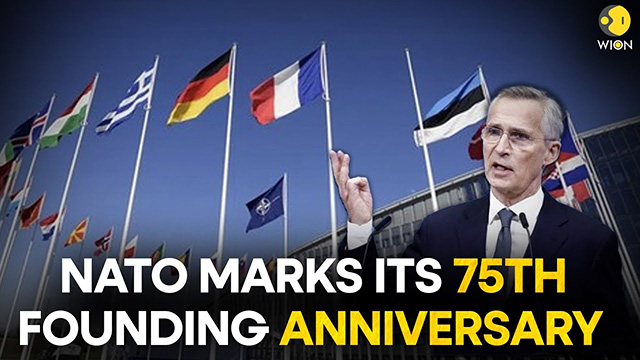
Seventy five years ago today – April 4, 1949 — foreign ministers of the United States, Canada, and 10 West European countries concluded the Treaty of Washington, creating what became the North Atlantic Treaty Organization.
The treaty committed U.S. (and Canadian) power and purpose to Western Europe to contain the Soviet Union. In the subsequent four decades, NATO was critical in ending the Cold War and Soviet suzerainty over Central and European Europe, and playing a role in the collapse of the Soviet Union.
Today the alliance is faced with a new challenge, that of Vladimir Putin’s Russia. Many observers and even some Western governments say that he had always contrived to put the old Russian (Soviet) empire back together and to push Moscow’s influence Westward, perhaps even beyond Ukraine, notes The Responsible Statecraft.
Not everyone would agree with that assessment, but the current challenge to the West is nevertheless palpable. Leaders of many NATO countries are convinced that, if not stopped, Putin threatens the Baltic states, Poland, and NATO’s newest allies, Finland and Sweden.
Historians will contend it is useless to revisit events and pretend that what happened in 2014 and 2022 could have been deterred. But in this case, there were leaders just after the Cold War who did try to shape European security in a way that might have avoided the current confrontation with Russia.
Even before the fall of the Iron Curtain in 1989, the H. W. Bush and later the Clinton administrations had a critical insight: A defeated Russia should not be treated with the harshness meted out to Germany in 1919, with the Versailles Treaty’s so-called War Guilt Clause that required Germany to accept total responsibility for causing the First World War. In Hitler’s rise to power, the treaty proved to be highly useful propaganda for targeting the demoralized and resentful German people.
Bush thus proclaimed the ambition of a “Europe whole and free” and at peace. As much as anything, that meant not stigmatizing Russia and, to the extent possible, enabling it to play a serious role in the new security architecture the West was putting into place instead of simply disbanding NATO and tempting fate.
NATO thus gained Russia’s membership in its flagship Partnership for Peace and Euro-Atlantic Partnership Council. It also welcomed Russian troops in the post-Bosnia War Implementation Force (IFOR) – the first such military cooperation since U.S. and Soviet forces met on the Elbe River in 1945.
Most damaging to the chances for building shared security and avoiding a new confrontation, in 2008 President George W. Bush pressured NATO to declare that Ukraine and Georgia “will become members of NATO.” This was clearly beyond what any major country could accept (for the U.S.: think Cuba) and violated the 1997 tacit understandings on Ukraine’s position between East and West.
Both NATO and the United States have repeated that pledge regularly ever since — ironically so, since it is virtually inconceivable that the alliance could get the required consensus of its 33 members in order for Ukraine to join.
At the same time, it has become too easy and popular to proclaim a new cold war with Russia. That would mean high risks and costs, political and psychological rigidities, and constant fears of miscalculation and possible escalation from one war (Ukraine) to broader conflict on the Continent. One has to remember that from the time when the U.S.-Soviet confrontation stabilized strategically — about 1963 — it would be more than a quarter century before the Cold War ended.
Moreover, it has become too easy to ignore an incontrovertible geopolitical reality: that Russia cannot be wished away. At some point, it will again become a great power, though unlikely to be a superpower as was the Soviet Union. The West, beginning with the United States, will have to deal with this fact, in our own self-interest. That argues for caution, especially at this summer’s NATO summit, to keep from crossing the Rubicon to permanent confrontation with Russia.
NATO must not close off all avenues of non-military engagement, including navigating a pathway to a negotiated settlement to end the Russia-Ukraine war. It cannot abandon its strategic stabilization and arms control efforts, and should not promote a new division of Europe between friends and permanent foe. Support for Ukraine in its valiant defense, yes; thwarting alternatives to a new cold war, no.
read more in our Telegram-channel https://t.me/The_International_Affairs

 10:43 06.04.2024 •
10:43 06.04.2024 •






















